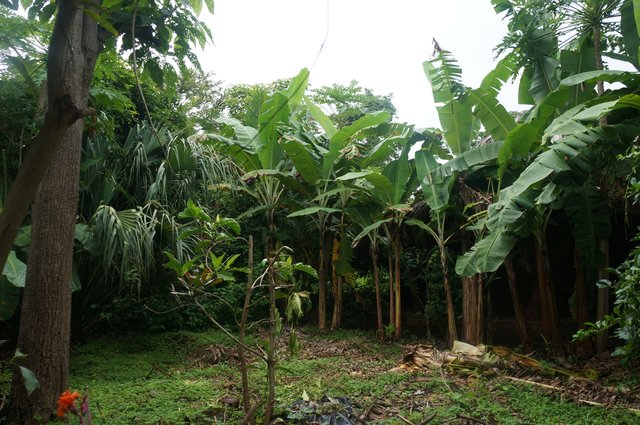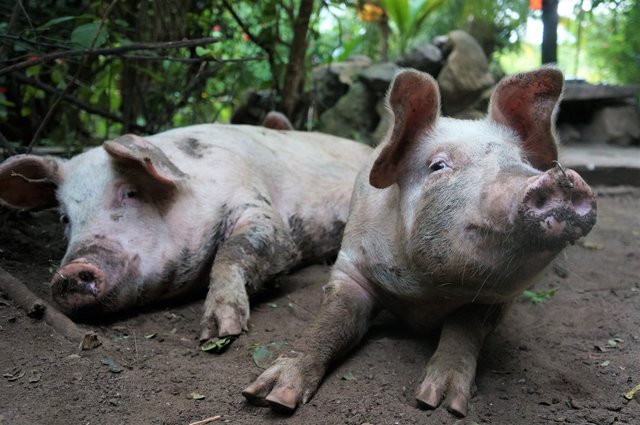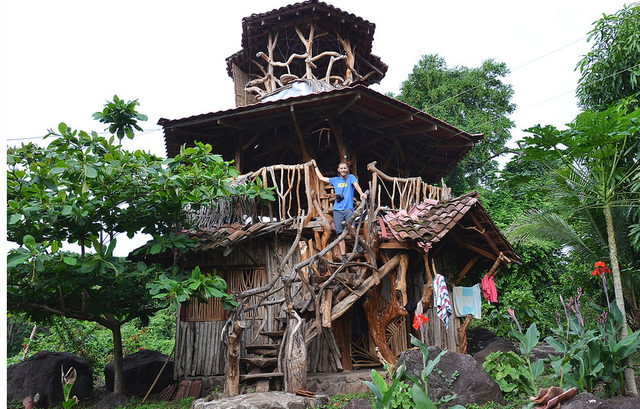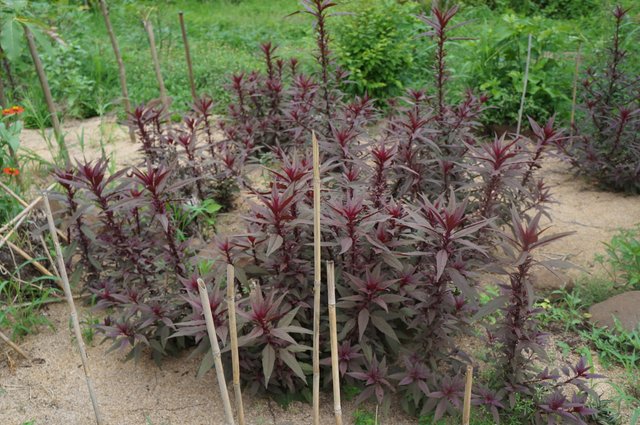As I said in previous posts, I spent a little time on Ometepe in Nicaragua. This post is about my time spent with the local gardeners.
The hostel I was working at, Little Morgan's Hostel is run by a guy called Morgan (the father of Little Morgan). Morgan is the kind of man that continuously makes you raise your eyebrows in heartfelt surprise at the many tricks of knowledge he has up his sleeve. On the face of it, his hostel appears as a drinking haunt for half-arsed backpackers trawling the same trail as all the other fish in the sea. But when you look slightly closer at the inner sense of community within his circles, you see a glorious mix of locals and internationals intermingling to get all the jobs done and Morgan flitting between them all with equal understanding, appreciation, and eagerness for each.
When I first suggested to him that I come down and build a garden for his restaurant, I was aware that his whole site was a menagerie of tropical trees and flowers planted himself. However, when I first visited a year ago, I wasn't looking through permaculture lenses so in reality the true depth of the intricacies of his plantings had never occurred to me. No doubt it doesn't occur at all to the backpackers who travel through there, distracted by the excitement of their short breaks from regular life, juiced up on alcohol and adrenaline from all the wonderful places they've swooped through. It's not fair to say people don't notice the beauty, but they don't necessarily notice the multifunctionality of the beautiful site; me included.

However, this time around I was entering with a new perspective and a different purpose. This enabled me to pop on my observation googles to notice what was hiding among the jungle chaos of the place. I was headed to build a garden on a spot which had previously been used for growing, but had become overgrown. Before I even got to the garden, I noticed that the bar itself is surrounded by a plethora of fruit trees and various other edibles. Mangoes, pineapples, squashes, coconuts, bananas, and plantains are casually hanging around dripping with goodies, and that's just from a quick glance. And you can't miss the animals mingling in and churning that soil while grabbing belly rubs from the patrons.

The thing is that the intricate density of all the green that splurges across this climate and landscape is difficult to comprehend. You need to have a helping hand. Often in permaculture we can be a little...let's say...know-it-all. The principles set out by Bill Mollison and David Holgrem have served as a fantastic manual for working; the issue is that often we butt heads with local people when we come in with our white people club of new age farmers and tell them how they should be doing it. I'm not doubting the validity and excellence of permaculture and regenerative agricultural methods, but nobody knows the land better than the people who have had their hands in it every day of their lives.
I'll be honest, when Morgan introduced me to the garden guys, I was intimidated. These guys have done this every day in the blistering heat, wearing jeans and knocking back whisky while they get the job done. Not only that, they built the myriad of phenomenal structures from the very garden they grew.

Source:volanthevist
I couldn't see them really taking my ideas, physical self, or vision seriously. While we want to think that our brand of feminism is the way forward, there's no escaping the fact that traditionally, women do not work in the fields here. I was prepared for them to reject my capabilities. I was wrong.
They welcomed me into their team with open arms and spent a great deal of their precious time working with me to teach me some of the intricacies of the land and some of their knacks. But it didn't stop there.
To begin with, it was a very macho experience; them trying to take the hard labour out of my hands, somehow humouring me with my little gardening fancies. But before long and as my Spanish developed, it became an exchange of friends and it ignited an interest in all of us.
It first started with the oldest guy in the crew, Chefan. Chefan tried to put an insect repellant on the soil and I nearly exploded with desperation. I didn't want to insult him but I wanted to grow organically and I wanted to test the methods I'd be taught. I politely and in the most restrained way I could, asked him not to. I will never forget the look he gave me. The pause of a man who had lived many lives while never having left that island. The pause of a man who'd seen a million faces shit all over his culture and suddenly see one who wanted more than cheap plastic and throwaway touism. He cracked this smile so wide that I could have fit a boat in his mouth. He gestured for me to come with him and pointed to a neem tree, handing me the longest machete I'd ever seen and signalling that he'd give me a boost. When an indigenous Ometepian pulls you into their fold and tells you to climb that tree, guess what you're doing. Up the tree I went and retrieved some neem. He put the neem, some garlic, and some of the local brain-blowing chilies in a bucket and we left it over night. We sprayed this all over the ground and plants and I had no bugs (for a while, this is the tropics, not Never Never Land!). He later laughed about how his Grandfather taught him this but he'd never used it and was amazed it had worked.
It only escalated from there. Chefan came to one night with the head builder, Luiz, and they said to me: 'I see the fire in your eyes'. And we talked. Over whisky and tears we spilled our hearts. Luiz explained to me about how Chefan and himself bring young boys to come and work at the hostel to teach them about empowerment. No doubt you have seen the raucous of politics happening in Nicaragua right now; this was at the backbone of everything they were teaching. They taught these young boys to plant the seeds, grow the trees, design the building, choose the right branch, and build from it. They taught them to utilise what nature gives them, not to control it or break it or bend it to one's will, but to work with it and create from it. They taught them to be empowered by the land, not to try and take power over it. They taught them that they didn't need an oppressive regime if they could take care of everything themselves and until they could, they had no business fighting that regime (that's a story for another time).
From here on in, these two older men had the younger men work with me. They explained that of they taught me the hands on sneaky tricks, I would teach them the science. I taught them to rebuild the terraces along contour to preserve water.
.JPG)
They taught me to grow yard beans along the fences to keep weeds out, I taught them to stake yucca as the fence. They taught me to pierce pigs noses to stop them rooting, I taught them to use the pigs to root the pesky bindweed first. They cut down the overgrowth while I made them hot sauce from the local chilies. They taught me to plant my nursery in a bed of ashes, I taught them to create guilds to protect the tomatoes from fungus. They taught me the native plants and I taught them the names in English.

One day, when I was suffering from conjunctivitis and everyone was throwing back antibiotic drops, they made me an eye wash from witchhazel.
I taught them to look for the signs of pests and adjust the carbon to nitrogen. They taught me that the jungle will do what it will, and to eat what grew and enjoy it.
I spent many a night discussing philosophy and corporations with them. I will never forget the tears in Larry's eyes when he was sure he was crazy, trying desperately to explain his own personal observations of how pesticides seem to affect the land and how nobody seemed to believe him. He'd never left the island, he doesn't have the internet, he knows nothing about the worldwide anger raging about the use of these products; he just knew what he saw and drew his own conclusions. The wholehearted embrace that he gave me when I explained about Monsanto was like I'd put his mind at peace.
It wasn't just knowledge they gave me. They gave me their hearts, their community. They had their wives teach me Spanish and how to cook. They shared stories and introduced me to their families.
Between us we grew a garden that managed to create some of the most delicious recipes I'd ever tasted, making that restaurant a bit more sustainable. Between us we managed to teach and learn and create. I thank them so deeply for those lessons and to me it's proof that social diversity creates resilience, it creates strength. Because alone neither of us had the answers, but together, we killed it.